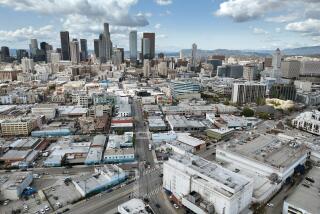Fillmore Denies Application to Rebuild Clinic
- Share via
Strict new planning laws adopted this spring have prompted the Fillmore City Council to deny an application by Clinicas del Camino Real to rebuild its earthquake-damaged downtown medical center.
The new guidelines--a blueprint of central city zoning for decades to come--call for the front third of storefronts within Fillmore’s downtown district to be used only for shops and restaurants.
That means the clinic, shaken irreparably in the Jan. 17 Northridge earthquake and later demolished, would be forced to open a retail pharmacy or other business in the front portion of the new building it wants to construct downtown.
Otherwise, council members said, Clinicas could lease or sell the front part of its structure, or it could find another place to rebuild. None of the alternatives pleases Clinicas officials.
“We’re very disappointed,” said Jack Hinojosa, associate director of Clinicas. “We wanted to utilize all of the floor space to provide medical, psychological, health education and other services.”
*
Architects already have drawn up plans for a 12,000-square-foot, two-story building on the clinic’s property at 355 Central Ave., Hinojosa said. It would be more than double the size of its 4,800-square-foot temporary facility behind City Hall.
Clinicas’ attorneys, Hinojosa said, are reviewing the Fillmore Specific Plan for potential flaws, but he stopped short of saying they may file suit.
The planning document, which took two years of meetings among city and community leaders to develop, seeks to lure foot traffic to the historic downtown by creating a retail mix of specialty shops and services.
“It’s critical to our community to keep that central area of town in a retail area to encourage what we would like to develop,” Councilman Scott Lee said. “That is a pedestrian flow of interesting shops, where one shop would complement another.”
The plan gives nonconforming businesses five years to change or relocate. But it also includes exemptions from its land-use policies for so-called civic buildings such as City Hall, the post office and churches.
Hinojosa said he understands the intent of the plan, but told the council that his clinic should also qualify for an exemption because it draws a lot of people to downtown Fillmore.
“With 18,000 visits a year, the businesses in the downtown area benefit from all of the foot traffic that passes through our facility,” Hinojosa said, adding that most of the clinic’s patients walk to the office.
*
Mayor Linda Brewster, however, said Clinicas, like any other medical office or business, must comply with the conditions of the Specific Plan.
“It is a vital part of the town,” she said of the clinic. “We do need the health center and the service, but it’s the location I have a problem with. It does not belong downtown.”
Roberto Rojas, who has managed the Fillmore Clinicas office from temporary quarters since the earthquake, said a retail shop in the front portion of the new building would limit the clinic’s space and threaten its nonprofit status.
“We’re not in the retail pharmacy business, we’re in the health care business,” Rojas said. “To sell (drugs) at a profit or even at a nonprofit rate, there may be some jeopardizing of the federal funds we rely on.”
Councilman Don Gunderson, the lone council member to vote against denying Clinicas its building permit, said he would have liked to give Clinicas time to conform to the downtown plan. But he was outvoted 4 to 1.
“It would have bought them a five-year window of time to provide retail or relocate,” Gunderson said. “It’s unfortunate that the earthquake made this such a desperate thing.”
Brewster said she had an obligation to maintain the integrity of the planning document.
Clinicas officials “are looking only at themselves and the services they provide,” the mayor said. “I’m looking at a much broader perspective, and the goal of what the citizens want for their downtown.”
More to Read
Sign up for Essential California
The most important California stories and recommendations in your inbox every morning.
You may occasionally receive promotional content from the Los Angeles Times.













